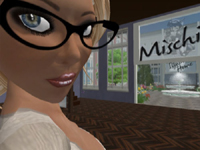Second Life exposed to strong criticism
Republican congressman Mark Kirk, who is seeking re-election this year, is pushing for legislation banning access in schools and libraries to Second Life.

Second Life is an Internet-based virtual world launched in 2003, developed by Linden Research, Inc, which came to international attention via mainstream news media in late 2006 and early 2007. A downloadable client program called the Second Life Viewer enables its users, called "Residents", to interact with each other through motional avatars, providing an advanced level of a social network service combined with general aspects of a metaverse. Residents can explore, meet other Residents, socialize, participate in individual and group activities, and create and trade items (virtual property) and services with one another.
Kirk strongly criticizes the virtual world: "Sites like Second Life offer no protections to keep kids from virtual ‘rape rooms,’ brothels and drug stores. If sites like Second Life won’t protect kids from obviously inappropriate content, the Congress will."
It seems indeed that teens are able to get into the adult portion of the service, and vice versa, but the company which runs Second Life actively monitor against minors accessing the adult portion of the service, and they are also helped by the virtual world's "residents."
"I think the strongest asset against [harmful] activity is the residents themselves who would simply stand up as one if they saw things of real concern," said Larry Johnson, CEO of the New Media Consortium, in his testimony last month. "They’re not shy about what they say in that world if they don’t think it’s proper behavior."
Even though Kirk's arguments are not convincing, it's quite clear that Second Life and other less sophisticated social networks are not educational and they do harm at least in that they waste time which could be spent with better use.
Last month, a congressional hearing was held on Capitol Hill in which virtual and real worlds blended in the discussions of subcommittee members, politicians, Second Life representatives and attendees. The unusual aspect of the hearing was held in both virtual and real world, as a virtual reflection of the real hearing room was being projected on a screen at all times.
The founder and chief executive of Linden Labs testified in front of the House Energy and Commerce subcommittee on Telecom and Internet after, two months ago, a report portrayed Second Life as a possible environment that may attract terrorist activities. Philip Rosendale answered that although such discussions most certainly emerged, they have no reason or evidence that point to Second Life as a place for such activities.
Other questions, related to how protected are children from online predators or if the Second Life virtual world could become a place for money laundry, suggest that the separation between virtual and real world is actually just a thin line that could be crossed at any time.
So the question about dangers lurking in Second Life activities remains open and it is still unclear who would be responsible for its so-called “by-effects”.
Subscribe to Pravda.Ru Telegram channel, Facebook, RSS!




